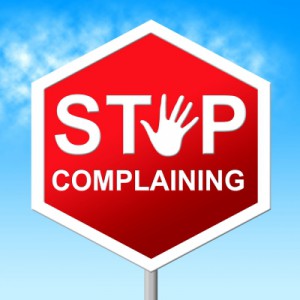Complaining is something that we learned to be a good thing, while we were growing up. Now you need to learn how to stop complaining if you ever expect to be happy.
Most of our lives, we and everyone else we know, have been busy complaining. It has become a way of life.
It’s so ingrained in our lives that we even start competing among ourselves about who has the biggest difficulties and who has the more valid reasons to complain more.
But after you read this article I hope you will see it for what it is. A habit that doesn’t help us. Something that robs us from our happiness.
It is a powerful destroyer of joy in our lives.
Why do we complain?
There are several main reasons why we complain. Either it makes us feel better, we use it to get approval from others or we use it to protect ourselves.
- it makes us feel better
We believe that if we complain we are somehow important. We are better then others because now we have all these issues that need to be solved. And ordinary people are just not that important to have our type of problems. We anxiously want to find the opportunity to solve our problem or crisis, thus proving our self-worth, self-importance and in the process we expect to feel better.
- it’s a way to get approval from others
Wanting approval from others is the biggest check we ever write. It is emotionally exhausting, unnecessary and also if we regard it logically, impossible to achieve. Thinking that somehow if we complain we get to be in that long awaited center of attention is just plain wrong, and we think that only because of the conditioning from our childhood.
Check out my article on seeking approval. Once you recognize what seeking or wanting approval really is, you will need to make a decision to stop doing it and start the real search for love and approval inside of yourself, where it has always been, always is and always will be.
- we use it to protect ourselves
This habit can also be a form of a self-defense mechanism. If I complain, then perhaps people will leave me alone. They will see that I am already in some negativity so perhaps there is no need to “punish” me further.
Maybe in this way I can protect myself from being hurt (again).
What we think happens when we complain
- things miraculously improve
Really, we need to challenge this belief. When did complaining ever make something improve? When did it make any situation better or bearable?
Complaining is not the reason required for change. Change can come from observance and ideally change can come from love.
Nobody is saying that you should not focus on improving your life conditions, but using negativity (and I hope you agree that complaining is only negative) to achieve any positive outlook (or change) is simply impossible.
Even in rare cases when there seems to be come change after complaining, it never comes easily or is never lasting for too long. A lot of effort is required to achieve and maintain conditions that come about as a result of forced change. That is why revolutions usually don’t end up as expected, it’s why mostly you have one dictator overpowering another, but the real reason why there was a revolution in the first place gets somehow left behind.
- we think it’s actually how problems get solved
Really? No they don’t!
Problems will always exist until you stop focusing on them. What you focus on increases.
If you focus on problems, then problems, for you, seemingly increase in its quantity. That’s why anti-something wars and movements will never work in the long run.
You can’t focus on negative because our minds don’t understand negations.
For example, if I tell you don’t think of a shoe, what comes to your mind immediately? Shoe right.
Don’t think on a pink elephant. See, I bet you got the picture of a pink elephant.
The same thing is when you complain and talk about problems and issues. You just get more of those in your life.
But this way of thinking, it’s so prevailing in our society because we are so used to using effort and fighting against what we perceive as the negative stuff.
That’s also the reason I decided to name this article “how to stop complaining” because I would not get too many people reading it if it was named “how to be happy”.
But I hope with time the understanding of the effect that negative pictures have will become common knowledge and then I will probably change the title. Really looking forward to doing that.
- somehow we expect to become part of a community
Yes. The complaining community. Wouldn’t you want to become a part of that group eh?
Why don’t you choose some other group to belong to?
How about the group of lovers? The group of self-lovers. Loving yourself is the first step in any lasting change.
Choose with whom you associate yourself really carefully. It will determine your life.
But what really happens when we complain
- we feel bad
In order to be a really good complainer, we need to bring ourselves into this energy fully and completely. And that means we need to get dirty with negativity. Just imagine how many other things will manifest into our lives by drowning in the negativity of complaining.
And the bonus part is, we first get to feel angry, upset or sad in order to fully complain. We kill our happiness right there and then, in order to demand a certain change that will then (and only then) allow us to be happy again. Talk about crazy, right?
- we focus mostly on the negative pictures
The power on focusing on the negative pictures is pretty much explained with the shoe and pink elephant analogy. Focus on desired outcomes instead on negative pictures. Don’t worry, because worrying only makes things worse, but if you can’t make yourself stop doing that, I recommend you check out my article on worry and in it you will realize why it never helps.
- with time we reinforce the beliefs
The more times we repeat a thought, the stronger that thought becomes. The stronger a thought becomes, the more automatic it becomes and subconsciously the deeper it goes. You see, our minds are constructed to save energy. So if we repeat something for a certain period of time, we start to form habits. Habits are just thought patterns that have been repeated so many times that are now accepted as ultimate truths by our minds.
Some scientists say that it only takes 21 days of repetition for something to become a habit for us. How about that? You tell yourself you have a problem for just 21 days, and you will make it so firm and reinforced that it will become your absolute truth.
That is until you finally decide to challenge it and start changing with love.
What our friends don’t want to say to us
- they are really sick of hearing complaints
It’s OK to offer support to a friend. But nobody wants to get drowned in others negativity. You probably already noticed that by yourself. If you continue to be negative and complain all the time, your friends will want to spend less and less time with you. And after a while, you will also get the opportunity to complain how you really don’t have any friends in your life because everyone pretty much abandoned you. A standard “poor me” story, right?
- our friends wait for us to stop so they can start with their own story
If you are a chronic complainer, that probably means your friends are probably complainers also.
Did you notice when we are having conversations, that some times we just want the other person to stop talking so that we can start talking.
It’s amazing.
Some researchers and communication experts claim that you should never start a conversation by stating the negative thing first and up front. You should use the negative statement in the middle of your conversation. They call this technique “the sandwich technique”. It goes like this. First you say something positive, then you state what was your primary negative concern that you wanted to communicate, and then you finish off with another positive.
That is because our mind starts to come up with defenses, justifications and arguments as soon as it hears something it doesn’t agree with (for example a critique).
If you start your conversation with a negative statement, your friend or colleague will not be listening to a word you said afterwards, but will be preparing for his or her own defense eagerly waiting to start speaking.
- when you complain, others get to feel better about themselves
I would not even put this into category of interactions with real friends, but because there are so many misconceptions about the definition of a true friend, I decided to include it as well.
There is a completely natural human conditioning that takes place. It’s a bit sick and perverse. And it’s something you find in egoistical people.
Your misery could actually make someone else feel better and happier because they will simply be grateful that they are not the ones suffering, meaning you give them a reason to feel good about themselves.
And they are more interested in feeling good then helping you. And also, sometimes when you complain it’s not the solution to the problem that you are really interested into, it’s for someone to be there for you, listening to what you would like to say, so that you can “get” all the things described in one of the previous chapters.
This is complete ego baloney and it is an ego mechanism that really needs to be recognized and dismantled.
4 ways to stop complaining
- recognize it’s never-ending story
How many problems or issues did you have up to now? What happened to all those problems that you have already solved?
You solve one problem, another one pops up. And it goes like that forever. It’s like a crazy person marry-go-around. You just keep spinning and spinning and spinning.
And, just so you know, you will never be able to solve all the problems in all the places all the times. So recognize this and decide to start dropping this habit.
- see the identity tied to it
The main function of the ego is to tie us down in this physical reality on as many levels as it is possible to do. The best and easiest way is to weave our identity into imaginary things, such as our stories.
We create this stories that stem from our perceived issues and problems, and somehow all of a sudden they become “me” or “mine”. We tie our identity to it.
Recognizing this is the crucial step in dissolving the whole issue.
- decide to stop milking the story for approval
There is a huge difference between real Love and human love. You can read about it more in my article about unconditional love. Basically if you decide to start looking for love inside of yourself, you get to feel good every time and everywhere. Wouldn’t that be a cool skill to develop?
- focus on appreciation for the things that are working in your life
Try to see the bigger picture in life. I bet there are things in your life that you are glad are there. That you are happy about.
We live our lives in the illusion of being in control. Actually there is so little in life that is in our direct control. But fortunately for us that little that is in our control is the only thing that can determine the type and quality of life we lead.
The only thing that is completely in our control is how we react on events and experiences that happen in our lives. We don’t control who we will meet, when, how, and what will happen. But we do control how we react. And that makes all the difference in the world.
It’s simple really. Focus on appreciating your life experiences, and those things and experiences will increase. Choose positive instead of negative.
Conclusion
I hope by now you are convinced that complaining is one of those nasty habits that you really need to let go of, should you ever be truly and lastingly happy.
There will always be problems in your life if and when you focus yourself on them, in that way you will probably always have an excuse to continue complaining. But you now have the information and also the opportunity to decide to stop complaining.
If you crave some additional information, browse through this site, there is a ton of useful information for you.
Also, if you are book person, read something from my list of great inspirational books.
Choose the appreciation, joy and happiness. Focus on good. I hope you now know how to stop complaining so you can choose to be happy!
Love,
Sinisa
Images courtesy of Stuart Miles at FreeDigitalPhotos.net








Hi Sinisa,
First I must congratulate you cos you managed to decribe exactly how I behaved today 🙂
For me the trigger was injustice at my work which concerned me directly and I spend most of my night and beautiful, sunny and warm day complaining to my dear friend hoping that my problem will dissapear simply by talking about it …well it didn’t! It only made me spend 2h thinking and talking about something that I can’t solve or I have any control over it! I didn’t and couldn’t appreciate those beautifull moments and company of my dear friend just because I let something from the outside define how I feel inside… and it sucks! 🙂
So I wish you posted this article yesterday then today I would be much wiser :p
Thank you for great articles and I’m looking foward reading you soon! 🙂
Take care,
Mathy
Hi Mathy!
I am really glad you liked the article. Believe me when I say, everything that is important for our personal development always comes in the right time for us. If you didn’t spend some time complaining and being upset today, this article would probably not create such a strong impression on you, so everything is as it needs to be 🙂
The most important thing is to notice that we always have the power and choice in deciding how we ultimately feel. Nothing from the outside can ruin our day if we choose to approach everything with love.
Recognizing that in life we really don’t have that much control, meaning that we don’t get to decide how, when and even if things will turn out the way we want them to, but still consciously choosing in this moment to feel free and happy – that is the real power and a secret of life mastery.
Thank you for following!
Love,
Sinisa